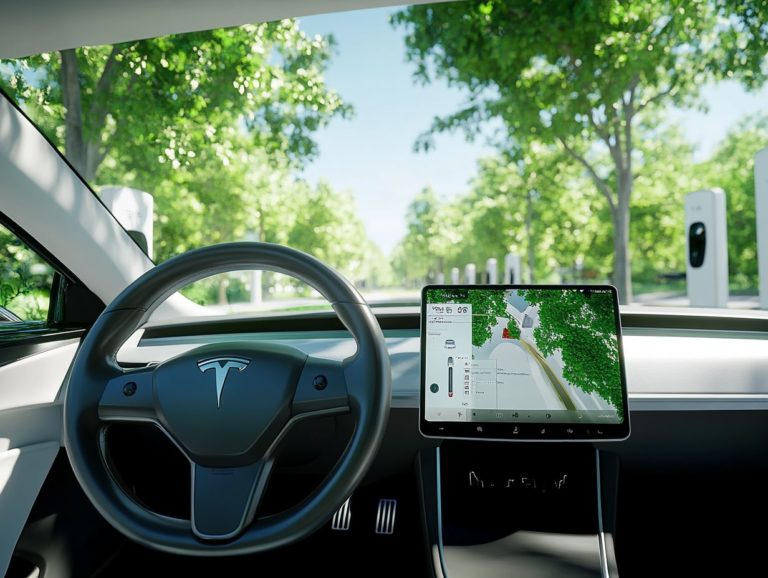Understanding the New Car Buying Process
Purchasing a new car can seem daunting, but it doesn t have to be. With a strategic approach, you can navigate the process with ease and confidence.
Get ready! This guide shines a light on the key factors you need to know as you explore your options, outline effective financing strategies, and provide tips for negotiating the best price.
It will also walk you through the steps to finalize your purchase and ensure a seamless delivery experience. Whether you re a first-time buyer or a seasoned pro, this guide is designed to streamline your journey and enhance your experience.
Contents
- Key Takeaways:
- Researching and Choosing the Right Car
- Financing Options
- Negotiating the Price
- Finalizing the Purchase
- Frequently Asked Questions
- 1. What is the new car buying process and why is it important to understand?
- 2. What are the main steps involved in the new car buying process?
- 3. How long does the new car buying process typically take?
- 4. Is it necessary to negotiate the price when buying a new car?
- 5. What should I consider when choosing a financing option for a new car?
- 6. Are there any additional costs I should be aware of in the new car buying process?
Key Takeaways:

- Do your research to ensure the car meets your needs and budget.
- Explore different financing options and lenders for the best fit.
- Be ready to negotiate and use effective tips for dealing with salespeople.
Researching and Choosing the Right Car
Researching and selecting the perfect car is a nuanced endeavor that demands your careful attention to various factors.
You’ll want to consider vehicle features, safety ratings, and the recent fluctuations in car prices influenced by the COVID-19 pandemic and ongoing supply chain challenges.
Understanding consumer behavior is vital for making the best choice! Utilize online review platforms and scrutinize vehicle history reports to ensure you make a well-informed decision on your car-buying journey.
Factors to Consider
When selecting a car, there are several critical factors you need to consider. This includes the vehicle’s features, fuel efficiency, comfort, and market trends in car prices.
Safety features often take precedence for shoppers; over 60% of buyers regard crash-test ratings as a key part of their decision-making process. Additionally, advancements in technology think car entertainment systems with GPS and music are increasingly influencing preferences in the marketplace.
Studies reveal that nearly 70% of consumers are willing to invest extra for those enhanced tech features. Niche markets like electric and hybrid vehicles are also on the rise, fueled by environmental concerns and government incentives, fundamentally reshaping the future of car buying.
Using Online Resources
Effectively utilizing online resources can elevate your car-buying experience, granting you access to comprehensive reviews, pricing information, and valuable insights, including understanding the role of expert reviews in car buying, which can help you negotiate with auto dealerships.
With platforms like Kelley Blue Book at your fingertips, you can tap into real-time data on vehicle values and dive into consumer reviews that outline the pros and cons of various models. This abundance of information simplifies price comparisons across different dealerships.
Leveraging auto loan calculators allows you to assess financing options and determine realistic monthly payments that align with your budget. These online tools boost price transparency, empowering you to make informed decisions, and fostering a more equitable and competitive marketplace for everyone involved.
Financing Options
Navigating financing options is an essential step in your car purchasing journey.
Understanding car loans, interest rates, and the diverse financing choices available from various auto lenders can significantly influence your overall expenditure and satisfaction with your purchase.
Making informed decisions here can lead to a more rewarding experience and financial outcome. Ready to start your car-buying journey? Let s hit the road together!
Understanding Loan and Lease Terms

Understanding loan and lease terms is crucial for smart financing decisions. These terms affect everything from your monthly payments to the overall costs of acquiring a vehicle.
These terms include important factors like interest rates, down payments, and loan duration. Interest rates can vary based on your credit score, while down payments reduce the amount you need to finance, helping lower your monthly payments.
The duration of the loan or lease impacts the total amount paid over time. Changes in monthly payments can significantly influence your budget and overall financial health.
By understanding these elements, you can effectively compare financing offers and find the option that aligns with your financial goals, leading to a more rewarding vehicle ownership experience.
Exploring Different Lenders
Explore different lenders to uncover the best financing options. Various auto lenders offer a range of interest rates and terms tailored to your unique needs.
Compare these offers now to save money over the life of your car loan. Interest rates impact not only your monthly payments but also the total cost of the vehicle.
Obtaining pre-approval from multiple lenders will empower you to budget effectively and negotiate confidently.
When choosing the right lender, consider your personal financial situation, including your credit score and income stability, to find a lender that meets your needs.
Negotiating the Price
Negotiating the price of a car may seem daunting, but it’s an essential part of the car-buying journey. It means understanding how to negotiate while leveraging your knowledge of car prices.
By mastering this process, you can secure a deal that aligns with current consumer behavior trends, ensuring you get the best value possible for your investment.
Tips for Negotiating
Implement effective negotiation tips to secure better car prices and increase satisfaction during your car-buying experience.
Set a clear budget beforehand to make informed decisions without feeling pressured. Research the true market value of the vehicle to avoid inflated dealer prices.
Knowing when to walk away is crucial; it helps you avoid financial overextension and signals to the seller that you are serious about your limits.
These strategies enhance your chances of securing a favorable deal while creating a more enjoyable purchasing journey.
Dealing with Salespeople
Dealing with salespeople can profoundly shape your dealership experience. It’s crucial to grasp the negotiation process and understand understanding the trade-in process while recognizing key elements of consumer behavior to advocate for your best interests.
Being well-prepared is the cornerstone of a successful interaction. This means doing your homework on vehicle pricing, knowing your budget, and understanding the features that are important to you.
By asking insightful questions, you can gain clarity on the dealership’s offerings while signaling to the salesperson that you re an informed buyer. Recognizing your own needs empowers you to negotiate effectively.
Many consumers overlook the emotional aspects of the buying process, but being aware of potential pressure tactics can help you stay composed and reinforce your negotiation position.
Finalizing the Purchase

Finalizing the purchase of your new car requires meticulous attention to detail. It’s important to grasp the nuances of document fees and thoroughly review and sign contracts. Additionally, understanding the role of brokers in car buying can help streamline this process.
Ensure a seamless experience when taking delivery of your vehicle. Each of these elements plays a significant role in enhancing your overall satisfaction as a customer.
Signing Contracts and Paperwork
Signing contracts and completing essential paperwork is a crucial step in your car-buying journey. It provides clarity on document fees and other obligations which can greatly affect your satisfaction with the purchase.
Before you finalize the deal, take a moment to carefully check each document, especially the sales agreement. This document outlines the vehicle’s price, financing terms (including the loan amount, interest rate, and repayment period), and any trade-in values that may apply.
It’s also vital to be aware of potential document fees that dealerships might add, such as administrative or processing costs. Don’t overlook the vehicle history report, especially if you re considering a used car, as it offers valuable insights into past ownership and any accidents.
By taking the time to ask questions and clarify terms within these contracts, you can ensure a smoother transaction and protect yourself from hidden surprises after the purchase.
Getting Your Car
Getting your car is the exciting moment you ve been waiting for! Here, the dealership experience and meticulous attention to detail can greatly influence your overall satisfaction.
At this pivotal moment, it s crucial to ensure that every aspect of the vehicle meets your expectations. Before you drive away, check the paperwork, verify the vehicle’s condition, and familiarize yourself with its features these steps are essential to ensure nothing is overlooked.
Take the time to inspect both the exterior and interior for any cosmetic concerns and confirm that all promised accessories are included.
A positive interaction with dealership staff can enhance your experience, giving you confidence that any questions or concerns will be promptly addressed. A thorough walkthrough of the vehicle s features provided by the dealership will empower you as a new owner, ensuring you feel confident and well-informed about your purchase.
Frequently Asked Questions
1. What is the new car buying process and why is it important to understand?
The new car buying process refers to the steps involved in purchasing a brand new vehicle from a dealership. Understanding what to expect during your new car purchase helps you make better choices and avoid costly mistakes when buying a car.
2. What are the main steps involved in the new car buying process?

The main steps in the new car buying process include research and budgeting, test driving and comparing vehicles, negotiating the price, arranging financing, and understanding the true cost of a new car before completing the paperwork for the purchase.
3. How long does the new car buying process typically take?
The length of the new car buying process can vary depending on factors such as the availability of the vehicle, the negotiating process, and understanding the trade-in process and financing. On average, it can take anywhere from a few days to a few weeks to complete the entire process.
4. Is it necessary to negotiate the price when buying a new car?
While it is not required, it is highly recommended to negotiate the price when buying a new car. This can help you get a better deal and potentially save you hundreds or even thousands of dollars.
5. What should I consider when choosing a financing option for a new car?
When choosing a financing option, it is important to consider the interest rate, loan terms, and any additional fees or charges. You should also shop around and compare offers from different lenders to find the best deal.
6. Are there any additional costs I should be aware of in the new car buying process?
Yes, there are some additional costs to keep in mind when buying a new car, such as sales tax, registration fees, and any extended warranties or add-ons. It is important to factor in these costs when creating your budget for the purchase.
Ready to find your perfect car? Start your journey today! Don t miss out on the best deals!






